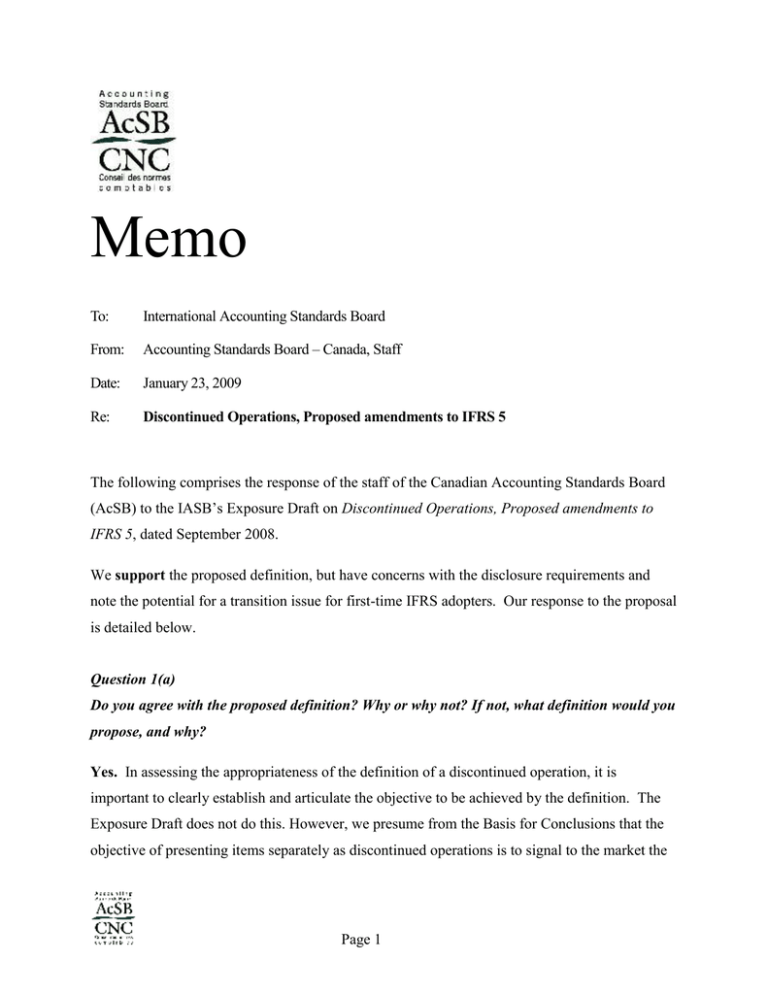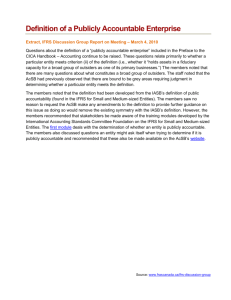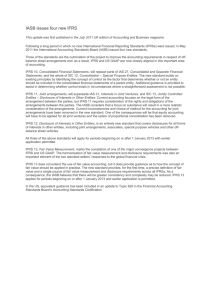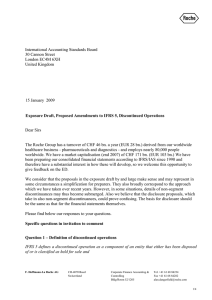AcSB Staff Response to IASB Disc Ops ED.doc
advertisement

Memo To: International Accounting Standards Board From: Accounting Standards Board – Canada, Staff Date: January 23, 2009 Re: Discontinued Operations, Proposed amendments to IFRS 5 The following comprises the response of the staff of the Canadian Accounting Standards Board (AcSB) to the IASB’s Exposure Draft on Discontinued Operations, Proposed amendments to IFRS 5, dated September 2008. We support the proposed definition, but have concerns with the disclosure requirements and note the potential for a transition issue for first-time IFRS adopters. Our response to the proposal is detailed below. Question 1(a) Do you agree with the proposed definition? Why or why not? If not, what definition would you propose, and why? Yes. In assessing the appropriateness of the definition of a discontinued operation, it is important to clearly establish and articulate the objective to be achieved by the definition. The Exposure Draft does not do this. However, we presume from the Basis for Conclusions that the objective of presenting items separately as discontinued operations is to signal to the market the Page 1 IASB – Improving IFRS 5, September 2008 AcSB staff response significant components of an entity that have been or will be disposed of and will therefore not contribute earnings or cash flows in future periods. Disposals of such components represent a major shift in the operations of the entity and highlighting this may provide important information to users. We believe that the proposed definition of a discontinued operation, determined on the basis of whether an entity has made a strategic shift in its operations, achieves this objective. We support the IASB’s approach in building on an existing concept (operating segment) that has worked well in practice. Further, users and preparers of financial statements prepared in accordance with IFRS, US GAAP and Canadian GAAP are already familiar with the term “operating segment.” While familiarity should not be the sole determining factor in selecting a criterion for presenting discontinued operations, we are not aware of problems that could arise from using the criterion proposed. We agree that using operating segments as the criterion would simplify the determination of what should be presented in discontinued operations and is consistent with the presumed presentation objective. Also, we agree that it would be appropriate to present a business (as defined in IFRS 3, Business Combinations) that meets the criteria to be classified as held for sale on acquisition, in discontinued operations, since the carrying amount of the business will be recovered primarily through sale, rather than use. Finally, financial statement comparability internationally will be enhanced with the use of a consistent definition of a discontinued operation under IFRSs and US GAAP. Page 2 IASB – Improving IFRS 5, September 2008 AcSB staff response Question 1(b) If an entity is not required to apply IFRS 8, is it feasible for the entity to determine whether the component of an entity meets the definition of an operating segment? Why or why not? If not, what definition would you propose for an entity that is not required to apply IFRS 8, and why? Yes. We believe the definition of an operating segment in IAS 8, Operating Segments, is clear and can be applied in determining whether a component of an entity meets the definition of an operating segment, even if an entity is not required to apply IFRS 8. We support the use of a single set of criteria for presenting transactions, based on the substance of the transaction itself, rather than the type of entity and whether it is required to apply IFRS 8. Question 2 Do you agree that the amounts presented for discontinued operations should be based on the amounts presented in the statement of comprehensive income? Why or why not? If not, what amounts should be presented, and why? Yes. We support the proposal that amounts presented in discontinued operations be based on the IFRSs used to determine the amounts presented in the statement of comprehensive income. This is necessary if the amount shown in discontinued operations is to present the comprehensive income from those operations on the same basis as comprehensive income for the rest of the entity. This consistency is important for users to understand the impact of the discontinued operations on the financial statements. Page 3 IASB – Improving IFRS 5, September 2008 AcSB staff response Question 3(a) Do you agree with the proposed disclosure requirements? Why or why not? If not, what changes would you propose, and why? No. We note that the disclosures in paragraph 41 are required to be made for “a non-current asset (or disposal group)” classified as held for sale or sold and the disclosures in paragraph 41A are required to be made for “a component of an entity” disposed of or held for sale. The unit of account at which entities will be required to disclose the information is inconsistent and this is likely to be confusing for users. No reasons for using different units of account for different disclosures are provided in the Exposure Draft. The requirement for additional disclosure about components of an entity that have been disposed of, or are classified as held for sale, regardless of whether it is a discontinued operation requires disclosures about more disposals than are classified as discontinued operations. Because the presentation and disclosure objectives are not clearly articulated it is unclear why two objectives are necessary and what benefits result. We believe that the disclosure requirements should be consistent with the presentation requirements unless separate presentation and disclosure objectives are defined. If an item to be disposed of is significant enough to warrant disclosure it should also be significant enough to be presented as a discontinued operation. Similarly, if an item to be disposed of is not significant enough to be presented as a discontinued operation, disclosures about the item should not be required. If the results from exposure suggest the unit of account should be lower than an operating segment, the definition of a discontinued operation should be modified to capture those smaller disposals, which would then also be covered by the disclosures required. Requiring disclosure on a basis that is consistent with the manner in which items are presented on the face of an entity’s financial statements will assist users in understanding how information in one statement relates to information in other statements, as well as the notes to those statements. Page 4 IASB – Improving IFRS 5, September 2008 AcSB staff response Finally, the disclosure requirements in paragraphs 41 and 41A should be integrated into a single cohesive set of disclosures. For example, paragraph 41(c) requires disclosure of impairment losses as does paragraph 41A(a) and, as already noted, these two paragraphs are inconsistent in the unit of account. Question 3(b) Do you agree with the disclosure exemptions for businesses that meet the criteria to be classified as held for sale on acquisition? Why or why not? If not, what changes would you propose, and why? No. We believe users of financial statements typically interpret financial results by comparing the financial information for the current period with that for immediately preceding periods. A business may be classified as held for sale on acquisition over several quarters or fiscal periods. In our view, a user would benefit from the ability to compare information among quarters or fiscal periods. Accordingly, we do not agree with providing an exemption from the disclosure requirements for these businesses. Question 4 Are the transitional provisions appropriate? Why or why not? If not, what would you propose, and why? Yes (in part). We support the transitional provisions for entities already reporting under IFRSs. For financial information to be comparable, it must be presented on the same basis for all of the periods presented. Restatement of the income statement should not be difficult, involving potentially reclassifying some disposals from discontinued to continuing operations. This is generally also true for information provided in note disclosures. However we agree with the IASB’s view in paragraph BC 21 that “an entity may face difficulties in obtaining the information to apply the proposed amendments retrospectively for the note disclosures”. Page 5 IASB – Improving IFRS 5, September 2008 AcSB staff response We believe this same difficulty will apply to first-time adopters of IFRSs. Without an amendment to IFRS1, First-time Adoption of IFRS, first-time adopters will be required to obtain the information to provide the note disclosure for the year of transition (i.e. the year prior to adoption of IFRSs). We do not see this as any different to the situation facing an entity adopting the disclosure proposals in ED 11 i.e. the requirement to provide comparative data for components sold or held for sale in the year prior to first making the disclosure. We therefore suggest that an amendment be made to IFRS 1 to provide transitional relief. We would be pleased to elaborate on these points in more detail if you require. If so, please contact Peter Martin, Director Accounting Standards at +1 416 204-3276 (e-mail peter.martin@cica.ca), Mark Walsh, Principal at +1 416 204-3453 (e-mail mark.walsh@cica.ca) or Karlene Mulraine, Principal at +1 416 204-3466 (e-mail karlene.mulraine@cica.ca). Page 6


